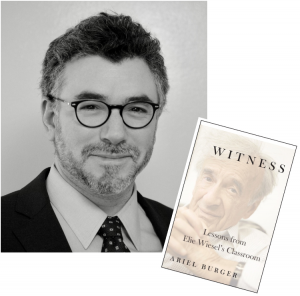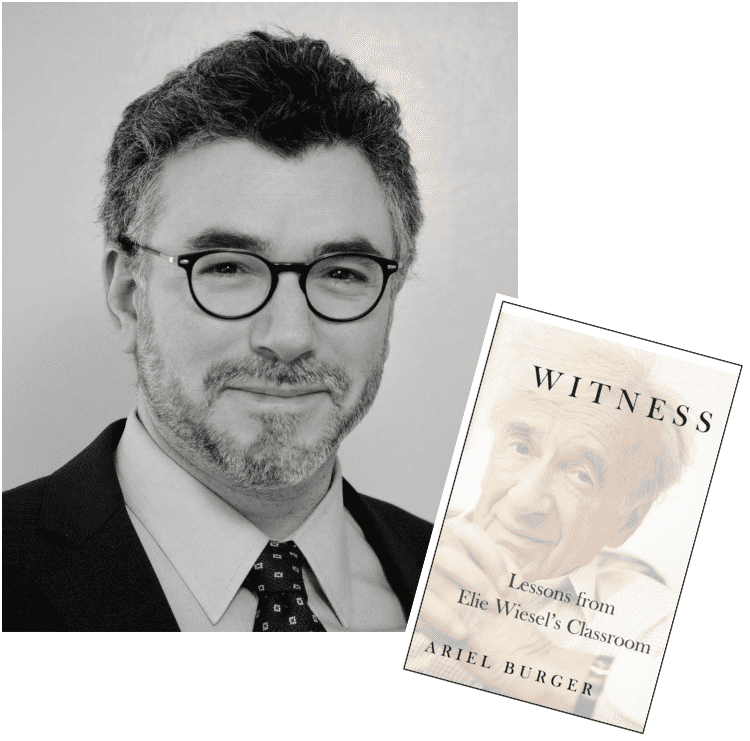 Monday, January 27, 7:30 pm, Congregation Beth El, Free, with RSVP to JewishVa.org/TidewaterTogether
Monday, January 27, 7:30 pm, Congregation Beth El, Free, with RSVP to JewishVa.org/TidewaterTogether
Ariel Burger was interviewed by Sarah Hurwitz at Politics and Prose in Washington, DC. As a Lee and Bernard Jaffe Family Jewish Book Festival author, Hurwitz came to Virginia Beach in December. Portions of this article are excerpted from that conversation, which was posted on YouTube.
Ariel Burger first met Elie Wiesel at age 15.
Burger attended a lecture in New York given by the Holocaust survivor, professor, philosopher, and journalist. After the lecture, Burger’s soon-to-be stepfather introduced them. “Elie Wiesel held out his hand and said his name to me,” says Burger. “He just addressed 2,000 people. I saw that modesty then and continued to see it over the years.”
After the lecture and over the next 10 years, Burger and Wiesel met sporadically. Bonding took place. Burger presented Wiesel questions about his religious life, about faith and doubt, and questions about different career paths. “He was very generous with his time,” says Burger.
“I was really confused about a lot of things and starting to ask a lot of important questions about my life, particularly about the deeply religious community I was brought up in, and the role of art and creativity. I identified as an artist from a young age, my father was a composer, and I was looking for people who could bridge those worlds. I saw Elie Wiesel as someone who could do that.”
In 1996, Burger enrolled in Wiesel’s class at Boston University.
“I was very, very, shy,” says Burger. “I sat in the corner hoping not to be noticed. I said one word the entire semester and that was only because he asked a question and he looked at me. He waited and waited. I said the word in my head, authenticity. Elie Wiesel nodded, ‘Exactly,’ he said.
“A few weeks later he asked me to become his TA. I was on my way to study in Israel and deepen my knowledge. I didn’t think I had enough to offer yet.
“‘He wrote me back and said ‘I read your letter and I understand. I will wait for you. When you’re finished with your studies, come back.’
“Wiesel saw teaching as the center and source of hope in the world,” says Burger. “He felt students could become activated moral creatures and he invested in that. He was a teacher first and foremost. His love for teaching was contagious.”
Deni Budman, a senior majoring in Film & TV and minoring in Jewish Studies at Boston University, works at the school’s Elie Wiesel Center for Jewish Studies. As a member of the Union for Reform Judaism’s College Leadership team, she heard Burger speak at the URJ Biennial last month.
“Ariel Burger is a phenomenal speaker and shares Elie Wiesel’s wisdom in a really unique and approachable way. He talks about him like he’s in the next room, which is also how he’s treated at the Elie Wiesel Center—which I love,” says Budman.
Burger’s book Witness, Lessons from Elie Wiesel’s Classroom, is filled with lessons learned for dealing with hate and anti-Semitism, a primary mission of United Jewish Federation of Tidewater’s Holocaust Commission.
This year, the Holocaust Commission presents the 23rd annual Elie Wiesel Student Writing Competition and the 18th annual Elie Wiesel Student Visual Arts Competition. The competitions create the bridge that Burger was seeking between the world of the arts and the connection to religion. Named after the Nobel Laureate, teacher, philosopher, and survivor, these competitions inspire students to see Wiesel as a model of thinking about humanity. He was pleased to be so honored, and when he was in Norfolk for Congregation Beth El 150th anniversary celebration, he signed books for all of that year’s student winners.
The competition often takes quotes from Wiesel and uses them to prompt students to address issues of historical significance, as well as current events. Wiesel’s gift was to make sure that the Holocaust, while it may be “the past,” seem relevant in the present, and make it clear that its lessons are vital for the future.
– Lisa Richmon
Eight Lessons from Elie Wiesel on Responding to Hate Crimes
1. When you see the signs of hate, don’t wait—fight it. What begins with words (slogans, articles, social media posts) becomes gestures (graffiti, toppled headstones), and eventually devolves into physical violence.
2. Believe the enemies’ words. They mean what they say.
3. There is no escape from history, and we must not become complacent. We have always had to fight against hatred, and there are lessons in memory. Be alert.
4. Use words carefully, with precision, to unmask, and name evil. What is worse than evil? Evil wearing a mask, presenting itself as good, or a joke, or an innocent mistake.
5. Don’t fight alone. Build unity within your community. For example, all Jews must put aside differences and see essential oneness.
6. Build unity across communities, too. Our friendship with others is a powerful weapon against the forces that try to divide us.
7. Don’t be defined by the hate you fight. Tragedy doesn’t define us; our response to tragedy does. As you fight hate, don’t fall into hate.
8. Remember to celebrate the things worth celebrating. With the grief, pain, and anger, there will also be moments of joy. Celebration is an act of rebellion, subversion, and revolution.
Presented by Lee and Bernard Jaffe Family Jewish Book Festival, the Milton “Mickey” Kramer Scholar-in-Residence Fund of the Congregation Beth el Foundation’s Tidewater Together series in partnership with B’nai Israel Congregation, Congregation Beth Chaverim, Congregation Beth El, Kehillat Bet Hamidrash, Ohef Sholom Temple, Temple Emanuel and Temple Israel and United Jewish Federation of Tidewater’s Holocaust Commission, in honor of International Holocaust Remembrance Day.
To learn about future events go to JewishVa.org/TidewaterTogether.

